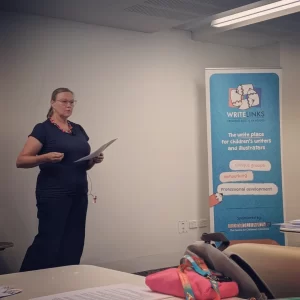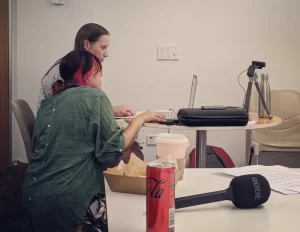
Quality Critiquing Workshop with Melanie Hill
I wrote my first chapter book for children in 2005. It was brilliant. It was a masterpiece. It was a future best seller. I know because my mum said so.
I still have the rejection letter from Penguin. It’s an actual piece of paper.
In 2019, in an effort to take my writing more seriously, I attended my first Write Links meeting and joined a critique group. Guess what I discovered?
I discovered that my mother loves me very much.
Fast forward to 2024 and there is still an awful lot more to learn about writing books for children, so I settled in for another informative Write Links meeting.

Author and editor – Melanie Hill
On March 2nd, our Write Links session was hosted by Melanie Hill, author, editor, and story nerd. She ran through the many techniques of how to deliver a meaningful manuscript critique.
Melanie explained the key to giving a good critique is knowing your craft. If you can understand the foundations, rules and structures behind the art of storytelling, your critiques become more ‘objective evidence’ than ‘subjective opinion’… and are probably a whole lot easier to give and receive.
Taking part in a critique group allows you to learn, grow and ultimately be a better writer, so it’s important to give your critiques the time and focus they deserve. Receiving written critiques can be helpful to support the editing process, but having an in-person conversation to clarify any comments is also key.
Melanie encouraged the group to listen to the author and understand their work before giving a critique. A manuscript in early draft stage may be seeking comments on structure, character and plot development. You can probably save the spelling, typo and punctuation edits for a manuscript that’s closer to submission.
Melanie admitted the critiquing process can sting if not done well. Honesty is fine but it shouldn’t be brutal. The author’s level of experience should guide your comments and always try to follow (or wrap) negative comments with positive ones.
When receiving a critique, always remember to gather what’s helpful and discard what’s not—but try to listen for themes and repetition as these can be a helpful guide.
After Melanie’s presentation, our fabulous celebrity-debut-author Annaleise Byrd joined in to perform a live expert critique with input from the larger group.

The group was given the first two chapters of an upper-middle-grade work to read, then critique, using the supplied ‘Prompt/Reflection’ sheet.
It was interesting to hear comments from the group and some opposing viewpoints. Some noticed inconsistencies in language, others noticed themes of maternal relationships, others were curious to know where the plot was going next.
It was helpful to observe different critiquing styles, with ‘big picture thinking’ and ‘perfecting the details’ critiques both offering valuable insight.

Rebecca Sheraton and Yvonne Mes
A big thank you to Melanie and Anna for hosting the session and to the writer who offered up their chapters to test-drive the group critiquing process. I hope the session drives your manuscript to bigger and better places. A bouquet of thanks to Rebecca and Yvonne for coordinating the session, wrangling the almost hopeless technology and preparing all the handouts for the group.
Next month, Write Links will offer critique groups for writers of picture books, junior, middle and senior levels. So, if you want to be a better writer, come along (and stop listening to your mother).
Blog post by JM Wisbey



